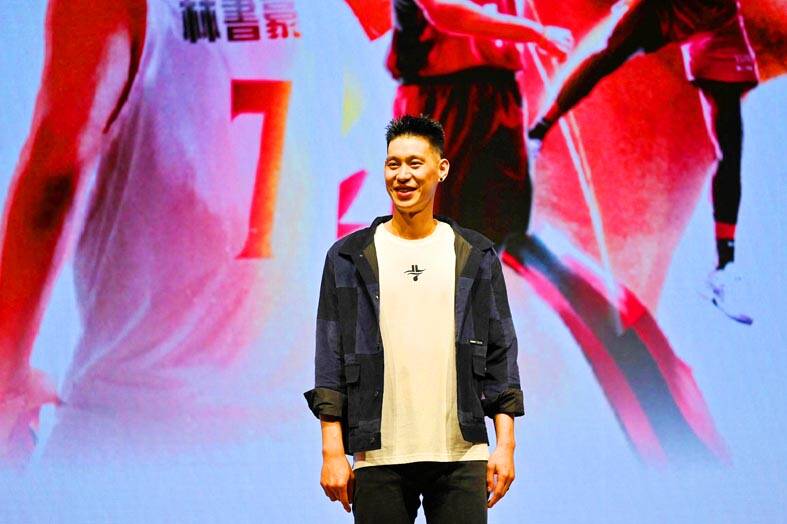The P.League+ on Tuesday handed the New Taipei Kings’ Jeremy Lin (林書豪) a five-game suspension after he received a blood treatment not allowed by the World Anti-Doping Agency (WADA).
No prohibited substances were involved, but the former NBA player contravened WADA rules by receiving Intravenous Laser Irradiation of Blood (ILIB), the P.League+ said in a statement.
ILIB is a laser therapy used to improve circulation and oxygen absorption.

Photo: Sam Yeh, AFP
In addition to the suspension from Saturday through April 6, Lin also faces a fine of NT$150,000, the league said, citing Article 24-3 of its rule book.
“Those who contravene the rules can face a one-year suspension, a lifetime suspension, or a fine of up to NT$500,000,” it said.
The disciplinary measures were announced hours after the Kings issued a statement saying the treatment was not intended to “enhance performance and only meant to assist in the recovery” of his foot injury.
Lin has been unavailable most of this year, playing only four of the team’s 18 games in the P.League+ and the East Asia Super League due to a plantar fascia injury sustained in late January.
The franchise said they had no idea that the treatment was not allowed by WADA, although it is legal according to the Ministry of Health and Welfare.
The franchise’s medical team has apologized to Lin for their negligence, the Kings said, adding that they would comply with the league’s investigation and have deleted a video showing Lin receiving the treatment.
The treatment raised concerns after the Kings uploaded a YouTube video on March 7 showing the 35-year-old receiving it.
Arnold Chen (陳志弘) of Taiwan’s Anti-Doping Agency, on Tuesday said that although WADA forbids athletes from manipulating their blood or the content of the bloodstream from within their blood vessels, whether or not Lin has contravened those regulations is still open to interpretation, as the agency’s laws do not specifically address the use of ILIB.
Taiwanese athletes can only use banned substances and methods of treatment if they submit paperwork to prove that the treatments do not enhance athletic performance and are the only option available to aid in their recovery, Chen added.
No research has proven that ILIB enhances athletes’ performance, said Tsai Wen-chung (蔡文鐘), director of the Department of Physical Medicine and Rehabilitation at Taoyuan Chang Gung Memorial Hospital.
However, “the core value of anti-doping rules is to prohibit the use of unnatural methods to change one’s physical constitution and the way it is constituted,” Tsai added.
Additional reporting by AFP

The combined effect of the monsoon, the outer rim of Typhoon Fengshen and a low-pressure system is expected to bring significant rainfall this week to various parts of the nation, the Central Weather Administration (CWA) said. The heaviest rain is expected to occur today and tomorrow, with torrential rain expected in Keelung’s north coast, Yilan and the mountainous regions of Taipei and New Taipei City, the CWA said. Rivers could rise rapidly, and residents should stay away from riverbanks and avoid going to the mountains or engaging in water activities, it said. Scattered showers are expected today in central and

COOPERATION: Taiwan is aligning closely with US strategic objectives on various matters, including China’s rare earths restrictions, the Ministry of Foreign Affairs said Taiwan could deal with China’s tightened export controls on rare earth metals by turning to “urban mining,” a researcher said yesterday. Rare earth metals, which are used in semiconductors and other electronic components, could be recovered from industrial or electronic waste to reduce reliance on imports, National Cheng Kung University Department of Resources Engineering professor Lee Cheng-han (李政翰) said. Despite their name, rare earth elements are not actually rare — their abundance in the Earth’s crust is relatively high, but they are dispersed, making extraction and refining energy-intensive and environmentally damaging, he said, adding that many countries have opted to

FORCED LABOR: A US court listed three Taiwanese and nine firms based in Taiwan in its indictment, with eight of the companies registered at the same address Nine companies registered in Taiwan, as well as three Taiwanese, on Tuesday were named by the US Department of the Treasury’s Office of Foreign Assets Control (OFAC) as Specially Designated Nationals (SDNs) as a result of a US federal court indictment. The indictment unsealed at the federal court in Brooklyn, New York, said that Chen Zhi (陳志), a dual Cambodian-British national, is being indicted for fraud conspiracy, money laundering and overseeing Prince Holding Group’s forced-labor scam camps in Cambodia. At its peak, the company allegedly made US$30 million per day, court documents showed. The US government has seized Chen’s noncustodial wallet, which contains

SUPPLY CHAIN: Taiwan’s advantages in the drone industry include rapid production capacity that is independent of Chinese-made parts, the economic ministry said The Executive Yuan yesterday approved plans to invest NT$44.2 billion (US$1.44 billion) into domestic production of uncrewed aerial vehicles over the next six years, bringing Taiwan’s output value to more than NT$40 billion by 2030 and making the nation Asia’s democratic hub for the drone supply chain. The proposed budget has NT$33.8 billion in new allocations and NT$10.43 billion in existing funds, the Ministry of Economic Affairs said. Under the new development program, the public sector would purchase nearly 100,000 drones, of which 50,898 would be for civil and government use, while 48,750 would be for national defense, it said. The Ministry of